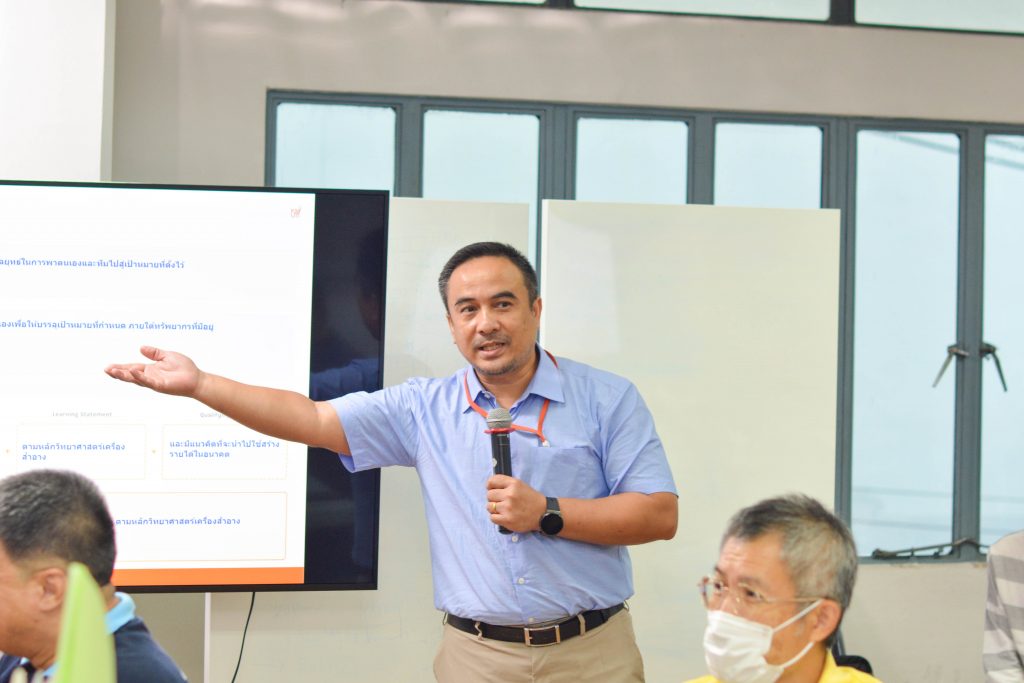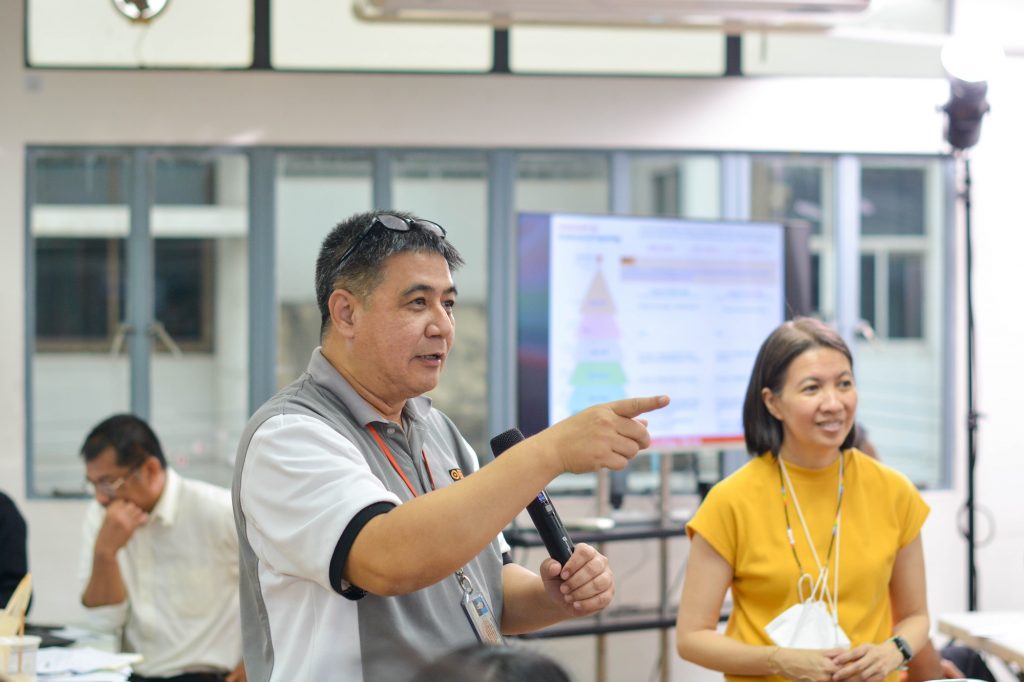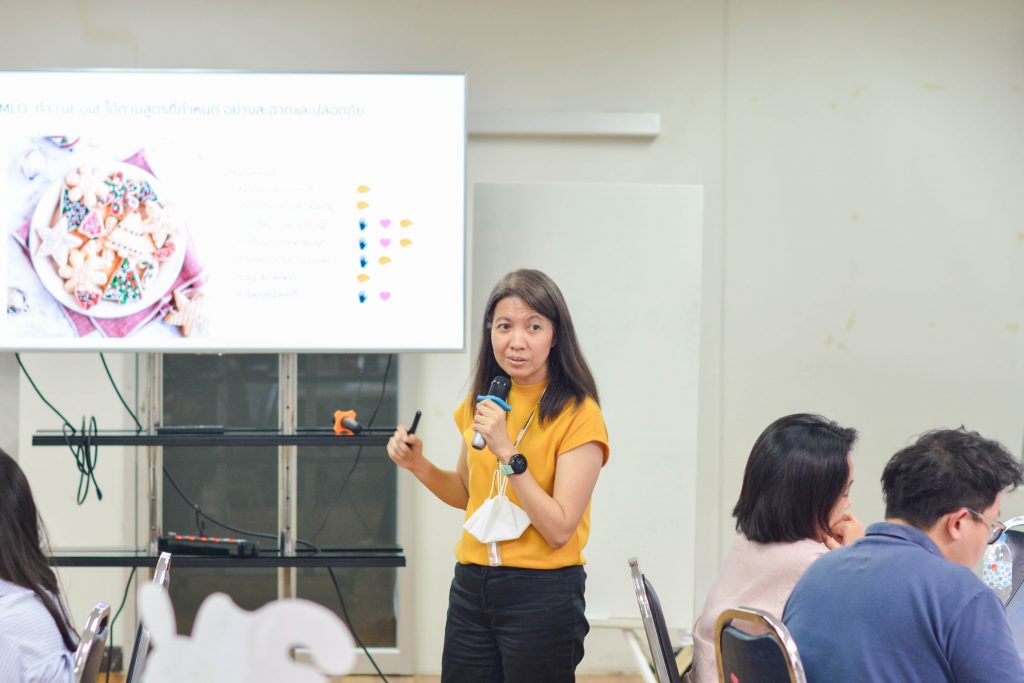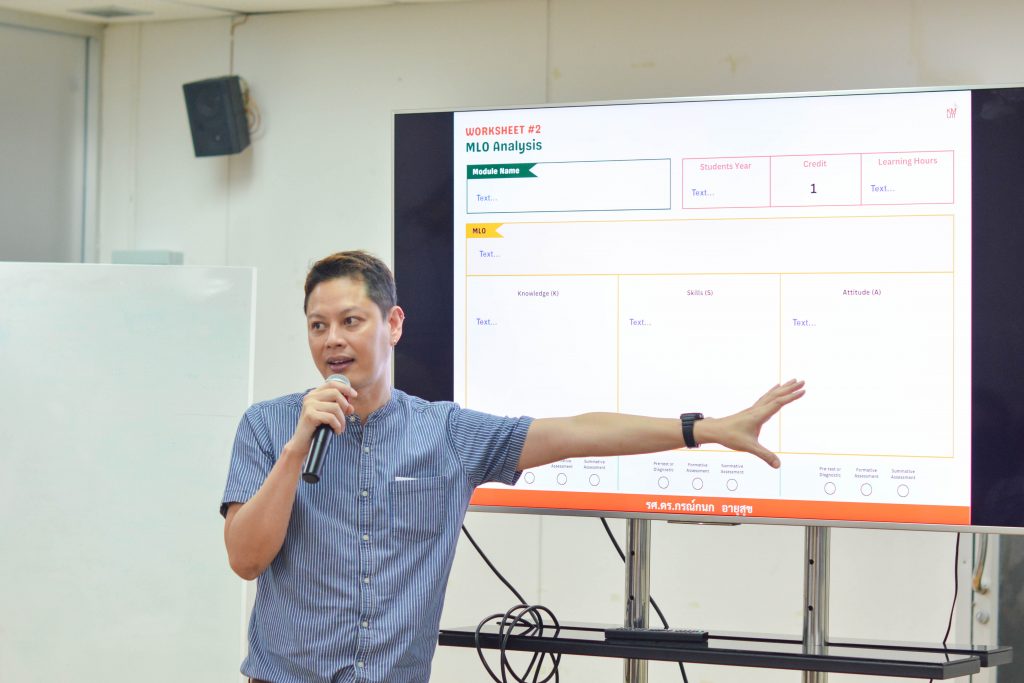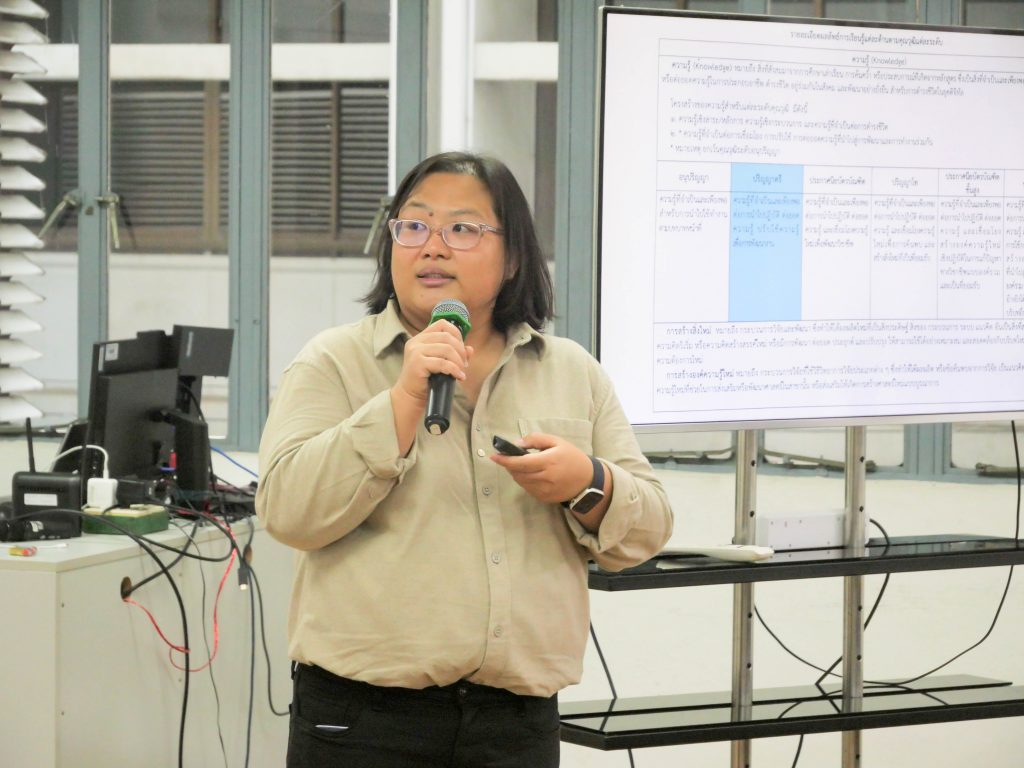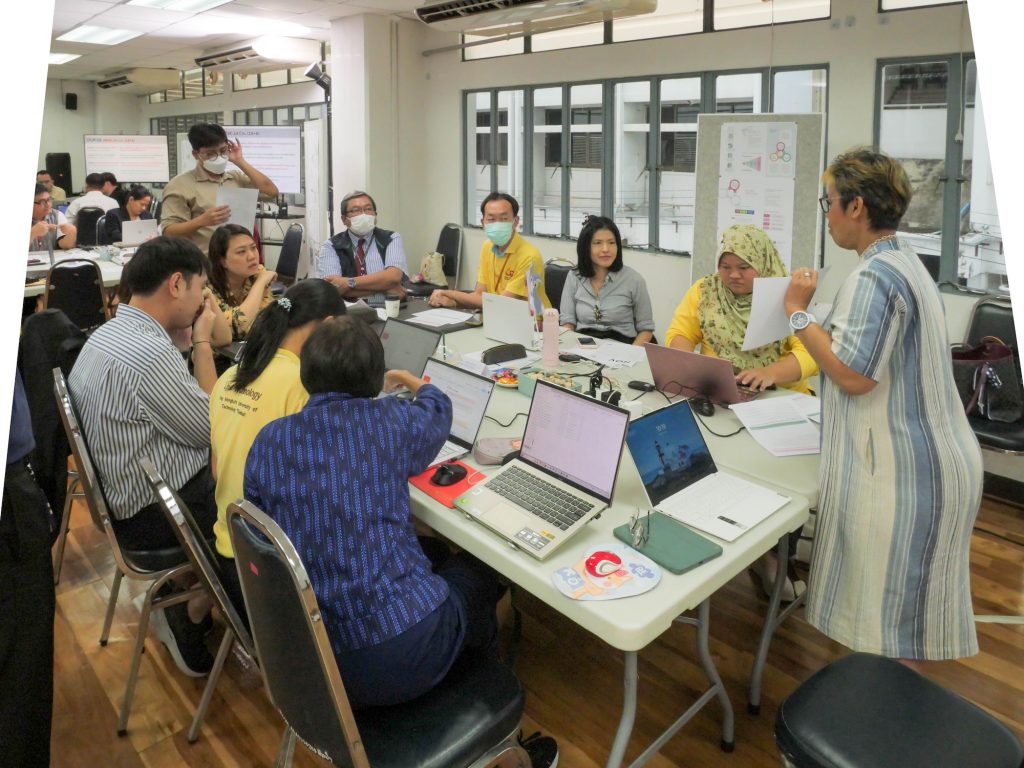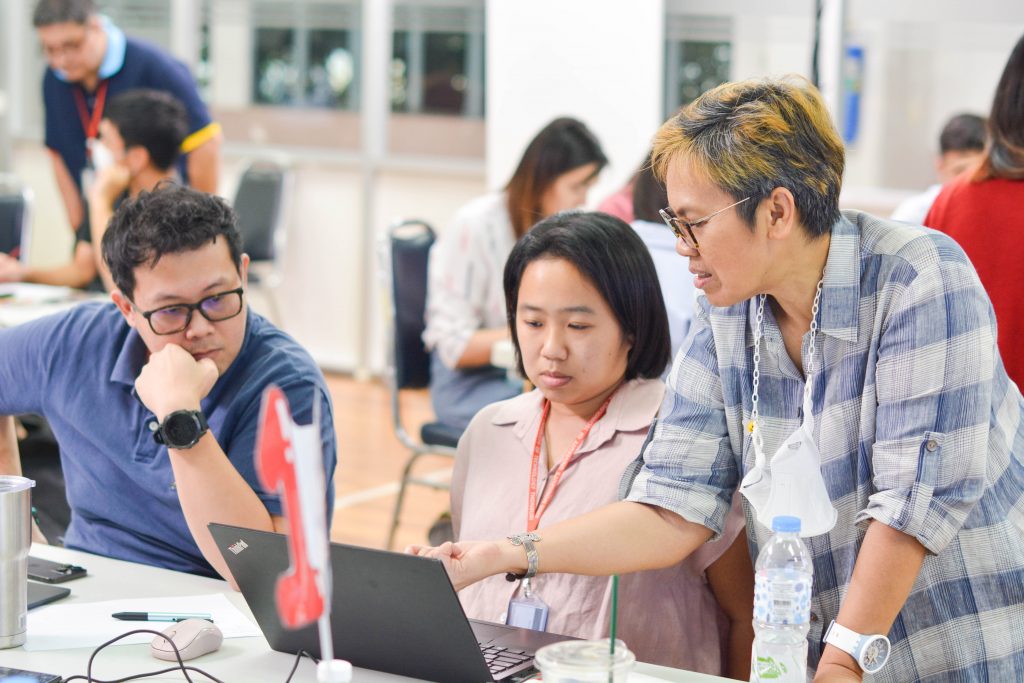สำนักงานวิชาศึกษาทั่วไป คณะศิลปศาสตร์ โครงการอบรมเชิงปฏิบัติการออกแบบหน่วยการเรียนรู้ตามแนวทางการจัดการศึกษาแบบมุ่งผลลัพธ์ (OBEM)
ด้วย สำนักงานวิชาศึกษาทั่วไป คณะศิลปศาสตร์ ดำเนินการปรับโครงสร้างและปฏิรูปหมวดวิชาศึกษาทั่วไป โดยพัฒนาผลลัพธ์การเรียนรู้หมวดวิชาศึกษาทั่วไป ที่มุ่งพัฒนาผู้เรียนให้มีทักษะคนและสังคมที่จำเป็นต่อการทำงาน (Essential Skills) ที่สอดคล้องกับแผนกลยุทธ์ของมหาวิทยาลัย และความต้องการของผู้ประกอบการทางด้าน Soft Skills โดยแบ่งเป็น 4 กลุ่ม ซึ่งผู้เรียนทุกคนจะต้อง “รู้และทำได้” การันตีผลการเรียนรู้ในแต่ละโมดูล และจัดการเรียนการสอนเพื่อพัฒนาสมรรถนะตามแนวทาง Integrated Liberal Arts Education
จึงได้จัดโครงการอบรมเชิงปฏิบัติการออกแบบหน่วยการเรียนรู้ตามแนวทางการจัดการศึกษาแบบมุ่งผลลัพธ์ (OBEM) เพื่อพัฒนาอาจารย์และบุคลากรทางการศึกษาของ มจธ. ด้านการออกแบบหน่วยการเรียนรู้ โดยใช้กระบวนการเรียนรู้จากการทำงาน(On the Job training) ให้มีสมรรถนะในการจัดการเรียนการสอนตามแนวทาง Integrated Liberal Arts Education จำนวน 2 รุ่น ระหว่างวันอังคารที่ 24 ตุลาคม 2566 เวลา 08.30 -16.30 น. และวันจันทร์ที่ 30 ตุลาคม 2566 เวลา 08.30 – 16.30 น. ณ ห้อง SoLA 204 ชั้น 2 คณะศิลปศาสตร์ มหาวิทยาลัยเทคโนโลยีพระจอมเกล้าธนบุรี ผู้เข้าร่วมอบรมฯ ประกอบด้วย อาจารย์และบุคลากรภายใน มจธ.จากหลากหลาย คณะ รวม 2 รุ่น 80 คน ทั้งนี้ได้เรียนเชิญวิทยากรผู้เชี่ยวชาญ ดร.กลางใจ สิทธิถาวร ผู้ช่วยอธิการบดีฝ่ายพัฒนาเทคโนโลยีการศึกษา ผศ.ดร.ภานุทัต บุญประมุข รองอธิการบดีฝ่ายพัฒนาการศึกษาและการเรียนรู้ และ ผศ.ดร.กฤติกา ตันประเสริฐ ผู้อำนวยการสถาบันการเรียนรู้ อบรมให้กับผู้เข้าร่วมโครงการฯแบบเข้มข้น โดยกิจกรรมการอบรมประกอบด้วย การบรรยายนโยบายการจัดการศึกษาเชิงผลลัพธ์ฯลฯ และกรอบแนวคิดการเชื่อมโยงผลลัพธ์การเรียนรู้หน่วยย่อย พร้อมกิจกรรมฝึกปฏิบัติ 4 กิจกรรม และปิดท้ายด้วยการนำเสนอผลงาน ซักถามข้อสงสัยแลกเปลี่ยนเรียนรู้ซึ่งกันและกัน
The Office of General Education at the School of Liberal Arts organized a training project focused on designing learning units in accordance with the Outcomes-Based Education Management (OBEM) approach.
The Office of General Education, School of Liberal Arts, undertook a restructuring and reform of general education subjects by developing learning outcomes for these subjects. These outcomes aim to equip students with the essential human and social skills required for the workforce, aligning with the university’s strategic plan and the soft skills demanded by employers. These skills are categorized into four groups, and every student is expected not only to understand them (“Know”) but also to apply them (“Can”). This approach ensures that every module delivers specific learning outcomes and that the teaching and learning process is structured to foster competencies in line with the Integrated Liberal Arts Education guidelines.
To achieve these objectives, a workshop project was organized to create learning units in line with the Outcomes-Based Education Management (OBEM) principles. The aim was to train KMUTT teachers and educational personnel in learning unit design using the On-the-Job Training (OJT) method. This approach empowered them to effectively organize teaching and learning in accordance with the Integrated Liberal Arts Education guidelines. The workshop was scheduled for two sessions, taking place on Tuesday, October 24, 2023, from 8:30 a.m. to 4:30 p.m., and on Monday, October 30, 2023, from 8:30 a.m. to 4:30 p.m. The venue for this workshop was SoLA Room 204, located on the 2nd floor of the School of Liberal Arts at King Mongkut’s University of Technology Thonburi.
The training sessions involved participants from various faculties within KMUTT, totaling two groups of 80 individuals. Expert lecturers, including Dr. Klangjai Sittithaworn, Assistant to the Rector for Educational Technology Development, Asst. Prof. Dr. Panutat Bunpramukh, Vice President for Educational and Learning Development, and Asst. Prof. Dr. Kritika Tanprasert, Director of the Learning Institute, led the intensive training for the project participants.
The training activities included lectures on outcome-based education policy and a conceptual framework for linking learning outcomes to sub-learning outcomes. These were complemented by four practice activities, concluding with presentations, discussions, and knowledge exchange among the participants.”

